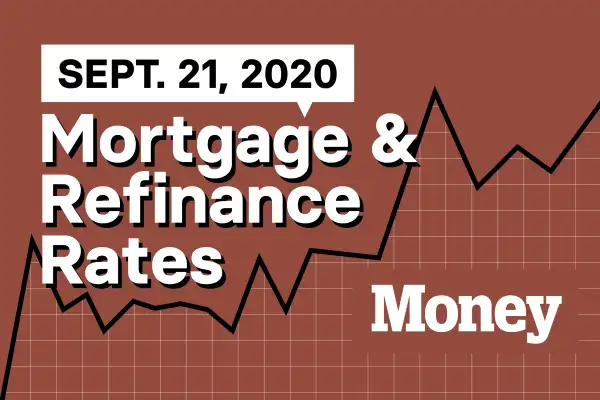Here Are Today's Best Mortgage & Refinance Rates for September 21, 2020

Borrowers with 700 credit scores were quoted an average rate of 3.625% to secure a 30-year fixed-rate purchase mortgage on Friday, according to Money's survey of over 8,000 lenders across the United States. At this credit score, roughly the national average, the rate for a 30-year refinance was 4.523%. Our rates include discount points and are for borrowers putting 20% down.
| 30-year fixed-rate purchase mortgage |
| 3.625% |
| Rate of September 18, 2020 |
Borrowers in Ohio were quoted the lowest mortgage rates on Friday—at 3.413%. Those in Colorado saw the highest average rate at 3.854%. Nationwide, borrowers with the highest credit scores, 740 and above, were quoted rates averaging 3.162%, while those with credit of 640 or below were given rates of 4.92%—a 1.758 percentage point spread.
You may be able to negotiate a lower rate if you shop around or if you have other accounts with the lender. (Money's picks for the best mortgage lenders are here.) Currently, some banks are hiking up advertised rates to keep demand in check, so you may be offered a lower rate if you reach out directly.
Freddie Mac's widely quoted Primary Mortgage Market Survey put rates at 2.87% with 0.8 points paid for the week ending September 17. The mortgage purchaser's weekly survey reflects borrowers who put 20% down on conforming loans and have excellent credit.
Refinance rates today
Money's survey also shows that the offered rate for a 30 year refinance for someone with a 740 credit score was 3.799% on Friday. Last September, the average mortgage rate (including fees) was 3.922%.
| 30-year fixed-rate mortgage refi |
| 3.799% |
| Rate of September 18, 2020 |
A homeowner with a $200,000 mortgage balance currently paying 3.922% on a 30-year loan could potentially cut their monthly payment from $946 to $932 by financing at today's lower rates. To determine if it's worth it to refinance your mortgage, also consider the closing fees you paid on your current mortgage, how much your new lender is charging and how long you have left on your loan term. (Our picks for the best lenders for refinancing are here).
What else is happening in the housing market right now?
U.S. homeowners with mortgages saw their equity increase during the second quarter of 2020, rising 6.6% over the past year, according to a report by real estate data and analytics provider CoreLogic. This represents a total gain of $620 billion and an individual gain of $9,800 per homeowner since the second quarter of 2019. Homeowners with mortgage represent 63% of all properties.
“Homeowners’ balance sheets continue to be bolstered by home price appreciation, which in turn mitigated foreclosure pressures,” said Frank Martell, president and CEO of CoreLogic. “Although the exact contours of the economic recovery remain uncertain, we expect current equity gains, fueled by strong demand for available homes, will continue to support homeowners in the near term.”
According to the report, home prices were up 4.3% year-over-year as low mortgage rates, high buyer demand and tight inventory increased competition for available homes. CoreLogic predicts home prices will increase during the next two quarters but at a slower pace until home prices stabilize next year and equity gains beome negligible.
Meanwhile, the share mortgages with negative equity — when the borrower owes more than the home is worth — decreased 15% to 1.7 million properties (3.2% of all properties). Year-over-year, the national aggregate value of negative equity was down 6.6%, from the second quarter of 2019 to $284 billion.
Mortgage Term of the Week
Understanding the lingo can be key to avoiding mistakes when you are buying a home or refinancing a mortgage.
Closing Costs: Expenses paid by the borrower to complete a mortgage loan transaction, these can include origination and appraisal fees, discount points, title insurance, attorney's fees and survey costs among others. Closing costs usually run 3% to 6% of your loan amount. So between $9,000 and $18,000 on a $300,000 mortgage.
For more read: Everything You Need to Know About Mortgage Rates in 2020
